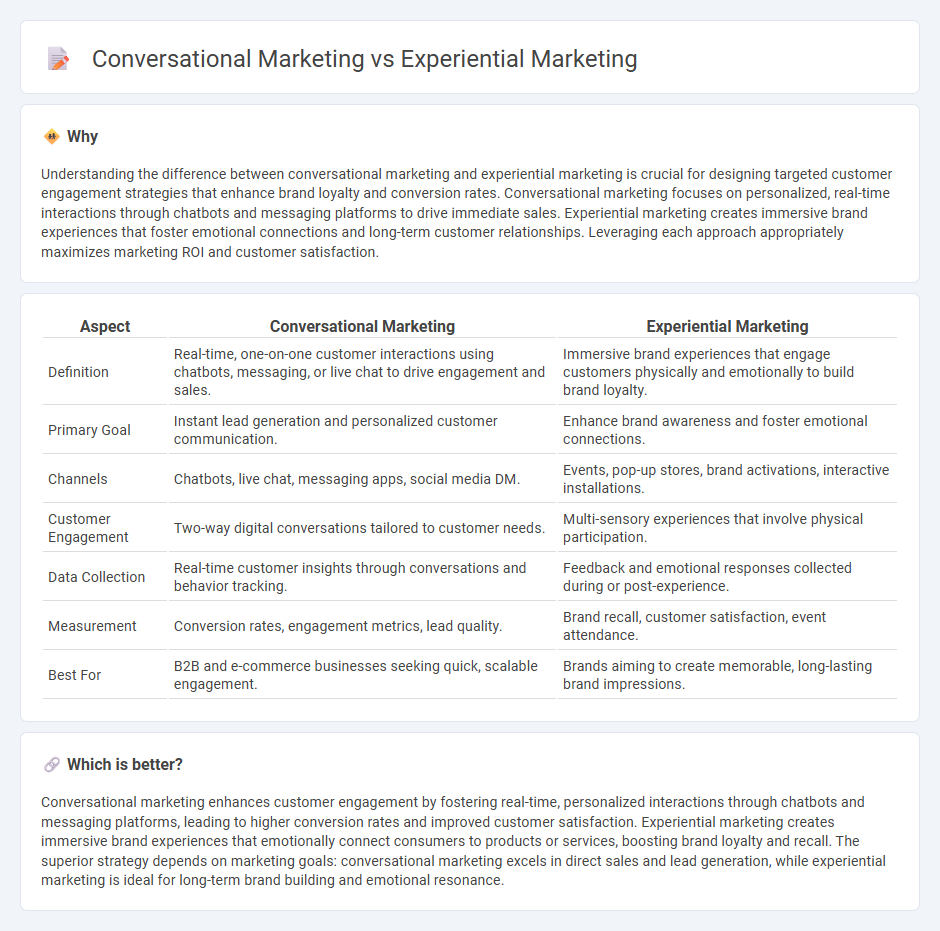
Conversational marketing leverages real-time, personalized interactions through chatbots and messaging apps to enhance customer engagement and drive conversions. Experiential marketing focuses on creating immersive brand experiences that foster emotional connections and memorable interactions with consumers. Explore deeper insights to understand how each strategy can transform your marketing approach.
Why it is important
Understanding the difference between conversational marketing and experiential marketing is crucial for designing targeted customer engagement strategies that enhance brand loyalty and conversion rates. Conversational marketing focuses on personalized, real-time interactions through chatbots and messaging platforms to drive immediate sales. Experiential marketing creates immersive brand experiences that foster emotional connections and long-term customer relationships. Leveraging each approach appropriately maximizes marketing ROI and customer satisfaction.
Comparison Table
| Aspect | Conversational Marketing | Experiential Marketing |
|---|---|---|
| Definition | Real-time, one-on-one customer interactions using chatbots, messaging, or live chat to drive engagement and sales. | Immersive brand experiences that engage customers physically and emotionally to build brand loyalty. |
| Primary Goal | Instant lead generation and personalized customer communication. | Enhance brand awareness and foster emotional connections. |
| Channels | Chatbots, live chat, messaging apps, social media DM. | Events, pop-up stores, brand activations, interactive installations. |
| Customer Engagement | Two-way digital conversations tailored to customer needs. | Multi-sensory experiences that involve physical participation. |
| Data Collection | Real-time customer insights through conversations and behavior tracking. | Feedback and emotional responses collected during or post-experience. |
| Measurement | Conversion rates, engagement metrics, lead quality. | Brand recall, customer satisfaction, event attendance. |
| Best For | B2B and e-commerce businesses seeking quick, scalable engagement. | Brands aiming to create memorable, long-lasting brand impressions. |
Which is better?
Conversational marketing enhances customer engagement by fostering real-time, personalized interactions through chatbots and messaging platforms, leading to higher conversion rates and improved customer satisfaction. Experiential marketing creates immersive brand experiences that emotionally connect consumers to products or services, boosting brand loyalty and recall. The superior strategy depends on marketing goals: conversational marketing excels in direct sales and lead generation, while experiential marketing is ideal for long-term brand building and emotional resonance.
Connection
Conversational marketing enhances customer engagement through real-time, personalized interactions that collect valuable data for tailoring experiential marketing campaigns. Experiential marketing leverages these insights to create immersive brand experiences that resonate deeply with target audiences. Both strategies prioritize direct consumer involvement, driving brand loyalty and increased conversion rates.
Key Terms
Immersive Experiences
Experiential marketing leverages immersive experiences to create deep emotional connections by engaging multiple senses and encouraging active participation. Conversational marketing centers on real-time, personalized interactions through chatbots and messaging platforms to foster meaningful dialogue and immediate customer engagement. Explore how integrating immersive experiences with conversational technologies can revolutionize your marketing strategy.
Real-time Interaction
Experiential marketing leverages immersive brand experiences to engage consumers through sensory interactions, creating memorable emotional connections in real time. Conversational marketing emphasizes personalized, real-time dialogues via chatbots and messaging platforms to nurture leads and drive immediate responses. Explore how integrating both strategies can enhance customer engagement and boost conversion rates.
Emotional Engagement
Experiential marketing creates immersive, sensory experiences that foster deep emotional connections between brands and consumers, enhancing brand recall and loyalty. Conversational marketing leverages real-time, personalized interactions through chatbots or live agents to address customer needs and build trust effectively. Explore the unique benefits of both strategies to elevate your emotional engagement with customers.
Source and External Links
What Is Experiential Marketing? - Experiential marketing is a strategy that engages consumers through live, immersive, sensory experiences, transforming passive audiences into active participants to build emotional connections and gather valuable data for brands.
Engagement marketing - Experiential marketing involves creating memorable, sensory-rich experiences that foster emotional attachment, enhance brand loyalty, and differentiate companies by combining sensory, emotional, cognitive, and rational values for consumers.
What is experiential marketing? Definition and examples - Experiential marketing connects brands with consumers through events like pop-up stores or virtual experiences designed to be memorable, relevant, measurable, and integrated with digital components for stronger engagement.
 dowidth.com
dowidth.com